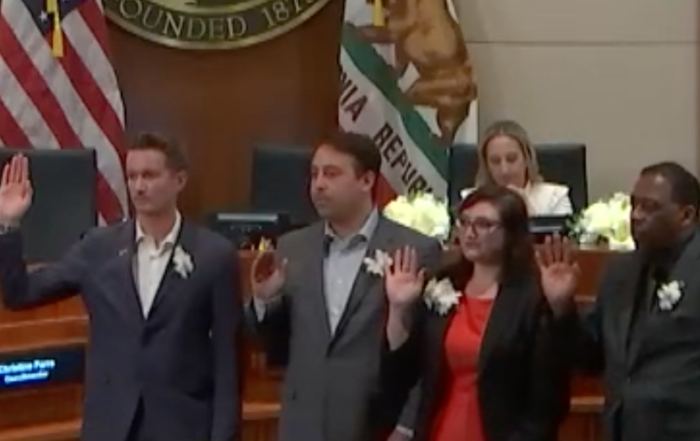On Tuesday evening, the West Hollywood City Council struggled to come to a consensus on whether to place a local measure on the November 2022 ballot that would implement a commercial and residential vacancy tax on property owners who leave their properties unrented. Such a measure would require a two-thirds voter support threshold because the tax specifies that proceeds would fund affordable housing development. Single-family homes, duplexes, and condos would be exempt.
City staff engaged a pollster who found, in a survey of 503 voters (4.4 percent margin of error), that currently, 64 percent favored a commercial vacancy tax versus 28 percent opposed. On a residential vacancy tax, 66 percent were in favor with 29 percent opposed, with the money raised from the tax going toward affordable housing development.
After a “push” question aimed at improving support was introduced in the poll, 73 percent indicated approval, with 22 percent remaining against a commercial vacancy tax. But when an opposition argument was introduced, support went down to 63 percent in favor. There was also a disparity between homeowners and renters, with 58 percent of homeowners in favor, and 32 percent against; renters were 69 percent in favor, and only 21 percent opposed. Homeowners make up 35 percent of respondents, while renters comprise 65 percent of the voter base.
Council members raised several questions following the initial presentation, with Councilmember Lindsey Horvath asking whether there were any guarantees that such a tax wouldn’t be passed on to renters. Councilmember John Erickson wondered if implementing such a residential tax would result in several Ellis Act evictions of entire buildings of renters.
When the public weighed in, they collectively had their doubts. Gerard Wright, Government Affairs Director for the Greater L.A. Realty Association, warned the council to “Tread very, very, carefully on this,” and suggested the proposal can’t move forward without four out of five council members in support, as stated in the city’s staff report.
Blake Perez of the Building Owners & Managers Association of Greater L.A. said, “We believe a vacancy tax on commercial properties is wholly unnecessary and unfairly punitive.” He continued, “The underlying assumption that property owners, left to their own devices, would otherwise leave rentable space vacant is incorrect. Property owners, especially in these unprecedented times, are very motivated to keep current tenants and lease vacant space as soon as possible.”
Former council member Steve Martin was more sympathetic to the basic idea, wondering whether many residential landlords don’t know what to do with vacancies and “are just AirBnB-ing them.” But ultimately saying, “I just don’t see this happening.”
Mayor Lauren Meister responded, “I don’t necessarily agree with the concerns.” She clarified by saying, “If their units aren’t vacant, they don’t have to worry about it.”
Councilmember Erickson was unsure, saying, “Given all of these unknowns, I just think this isn’t fully cooked. And at the moment, I just don’t know how this is going to be fully cooked.”
Councilmember John D’Amico expressed concern about both council and public support, saying, “If we’re not all in at 100 percent, it’s probably not going to pass.” He also questioned whether such a tax would truly solve long-term vacancies. Ultimately, he concluded, “This isn’t going to pass, I don’t think, if the entire city isn’t fed up with the way owners aren’t renting their properties. I don’t think it will pass if it requires two-thirds of the voters.”
“It will increase the cost of housing. It will increase the cost of businesses that want to come into the city,” concluded Horvath.
Sensing a lack of consensus, Mayor Pro-Tem Sepi Shyne suggested that city staff study what San Francisco is doing on the vacancy issue, and how they’re progressing with vacancy programs they’ve implemented.
Meister herself ultimately relented but remained resolute on finding solutions to vacancies. She suggested that if tax incentives aren’t the answer, then the council needs to find alternatives that may be the answer.
Ultimately, the council settled on a plan to monitor the results of vacancy taxes of other cities and report back by March of next year. And in the meantime, they agreed to look for alternatives for commercial and residential landlords to rent out their spaces and committed to stopping the AirBNB crisis that they say is plaguing the city.
Stay informed. Sign up for The Westside Voice Newsletter
By clicking submit, you agree to share your email address with Westside Voice. We do not sell or share your information with anyone.








